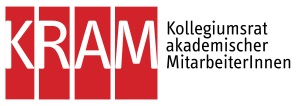Development of career paths in academia
Developing academic career paths further – towards and beside professorship
The further development of academic career paths is one of the core topics for KRAM. All over Germany, broad debates in this respect are raised in recent years. Ministerial and other groups take part in this political discourse. Concepts are developed to give better career chances in the sciences, also in Bremen as a city-state, and at the University of Bremen.
What happened in recent years at the University of Bremen...
Typical positions for academic staff are "funded by the state" or "third party funded". During the last decade, the University of Bremen develops and tries out new concepts, e.g. "senior researcher", "senior lecturer" and "university lecturer". But a systematic path towards these profiles was not developed until recently. In the first test phase (until 5/2017), prerequisites for being bestowed with the title "senior researcher" a dissertation paper, further scientific achievements documented by relevant publications, at least six years of experience in research and lecturing after the PhD, and successful procurement of third-party funds from prominent sponsoring institutions (DFG, VW). Additional, successful supervision of doctoral candidates was mandatory. Preferable also were experiences in leadership and international experience. And then, "senior researcher" was a mere title - specific rights or more money were not attached to it. Nevertheless it gave colleagues a better standing while applying for funding etc. Concepts related:
In this former concept you can see how University of Bremen dealt with its senior researchers and senior lecturers until June 2017.
The concept of university lecturer from 2/2012 still is valid, but undergoes changes since 2018 due to a new tenuret rack concept and the 4th BremHG-novella.
At the University of Bremen, also in the future "university lecturers" will have their position: According the the 4th novella of BremHG, since the 1st of Oct 2017 lecturers have 12 hours of teaching obligations (instead of 16 as before). KRAM understands this as a success in support of interests of this group of academic personnel since 2013. Since June 2017, the university offers a tenure track including a "lecturer-phase", which can lead further to a position as "senior researcher" or "senior lecturer". These titles are given since the BremHG novella in June 2017 exclusively to candidates on a tenure track (see AS Ordungsmittel Febr 2018 further down).
How University of Bremen carried their tenure track idea to term...
In 2015/16, a work group in the university*s management developed a concept for new career paths towards and beside professorship. This concept divides the professional path at the university in two phases: the "qualification" and the "academic career path". Within this qualification three steps are envisioned. The first two steps, a doctorate of three up to a maximum of six years, and at least two years as a "postdoc" after successful PhD are bond to qualify for a career within or outside of academia. Only the third step within the model is expected to qualify for the academic career. This step is being appointed as professor (pay group W1) with 4-8 hours of teaching obligations. Parallel to this path, the concept offers alternative profiles, as a "lecturer" with 8-10 hours of teaching, and a "researcher" with 4-6 hours of teaching. All three profiles in the third step include independent research and teaching assigned to a specific faculty, offering a contract limited to 4-6 years.
For the first time, this new concept includes a "tenure track" for these three profiles, towards the phase "academic career path": after 4-6 years of employment in this 3rd step, leading to qualification and successful evaluation, a board can appoint the candidate from a W1-professorship to a W2-professorship, and can promote a "lecturer" to "senior lecturer", respectively the "researcher" to "senior researcher". These three profiles in the last step of the tenure track differ from the profiles in the "qualification" phase insofar that they mean unlimited contracts. All these steps shall be financed by converting positions in faculties into tenure track positions.
By invitation of KRAM, the vice-rector for young scientists, Prof. Breiter, explained the concept at the 1st of June 2016 in a large meeting of academic employees. The KRAM wrote a memo of the thoughts colleagues mentioned in the meeting. As result of this and further discussion rounds on the issue, KRAM sent the university management a formal "statement on the concept" (7.6.2016).
Over many month developed, the concept for a future university structure of positions for academic employees beside and towards professorship was presented by the university management at the 30. Sept. 2016.
Filling the tenure track positions has started...
During the winter term 2016, the concept was ascertained further. At 17th October 2016, a large meeting with representatives of the university management, faculty deans, staff council representatives, equal opportunity commissioner, e.g. took place, last remarks were noted. Then, the concept was handed over to the senate of the sciences. The 4th novella of the BremHG (Higher education act of Bremen), allows now the realisation of the concept. It will be interesting to see how the concept takes root - on faculty level (personnel concepts) and by further elaboration (criteria, evaluation, etc.) of the law within the university.
One step of elaboration was presented in Februar 2018: The Academic Senate agreed to statues and regulations for the election and evaluation of "junior professors with tenure track" as well as for positions as "(senior) lecturer" and "(senior) researcher". First positions were advertised in 2018. Here the statues and regulations:
Selection regulation (in German) senior lecturer and senior researcher AS 2-2018
Evaluation regulation (in German) for junior professors with tenure-track AS 2-2018
Evaluation regulation (in German) for tenure track-professorship AS 2-2018
Evaluation regulation (in German) lecturer and researcher AS 2-2018
The University of Bremen offers since January 2019 information on the newly developed rectorate guidelines for tenure track professorships, open for all to scrutinize.
Further pilote initiatives: department initiative for an alternative path
Also in single faculties concepts for academic career paths are developed. They differ from concepts of the university management for example in the correlation of academic employees to professorships within a faculty. A concept of the Institute for Political Sciences (IPW) aims for a "department model". In this approach, a position after the PhD is publicly advertised, comprised of a W1-professorship. Insofar it is similar to the rectorate concept. But postdoc positions based on university funding are no longer intended. IPW colleagues hope to gain better planning capability of the own career paths despite lesser head count in the faculty. They count on a better resource management within the faculty, in light of less positions with reduced teaching obligations, as typical for time-limited positions in qualification phase one or two. Additionally, a better contribution of tasks in committees and more force in the appliance for third-party funding is hoped for.
Contact
Dr. Stefan Thierse (chair- & spokesperson)
Email: kramprotect me ?!uni-bremenprotect me ?!.de
Other topics
- Occupational safety & occupational health management
- Welcome workshops for academic employees with new contracts
- Development of a good leadership culture
- Laws & regulations with impact on academic employees
- In a nutshell: University structures for newbies
- Invite KRAM members into a meeting of academic employees in your faculty
- University-lecturers: discussion rounds & Stud.IP-Forum
- Surveys among academic employees
- Links & documents
- Advanced occupational trainings for academic employees


